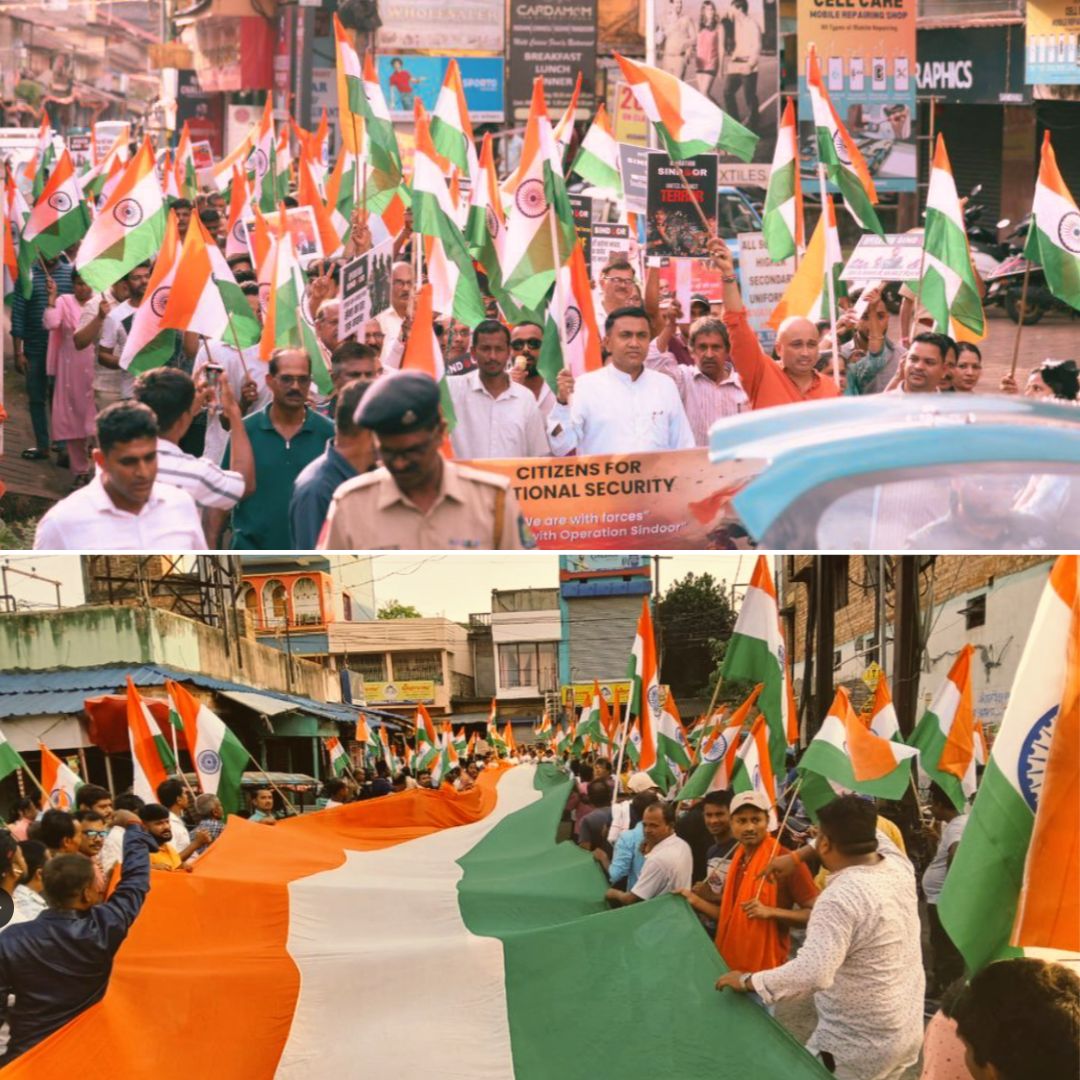Between May 13 and 23, Tiranga Yatras were conducted across India to celebrate the success of Operation Sindoor, a decisive military campaign launched by the Indian armed forces on May 7 in response to a brutal terror attack in Pahalgam, Jammu and Kashmir, which claimed 26 civilian lives, mostly tourists.
These nationwide rallies symbolised the country’s unity and unwavering support for the armed forces’ efforts to dismantle terror infrastructure in Pakistan and Pakistan-occupied Kashmir (PoK). Senior officials, including Union Home Minister Amit Shah and Major General Kartik Seshadri, highlighted the precision and strategic depth of the operation.
Despite ongoing tensions marked by cross-border drone and missile exchanges, India maintains that Operation Sindoor is ongoing, underscoring its commitment to national security and counter-terrorism.
A Nation United in Support of Its Armed Forces
The Tiranga Yatras witnessed enthusiastic participation from a broad spectrum of Indian society – from political leaders and veterans to students and common citizens – all waving the tricolour in a vibrant display of patriotism. In Ahmedabad, Union Home Minister Amit Shah led one of the largest rallies, praising the armed forces for their “valour, precision, and resilience” in executing Operation Sindoor.
He emphasised that the operation was not just a military success but a reaffirmation of India’s resolve to protect its sovereignty. Complementing the public rallies, the Indian Army released exclusive footage showcasing precision airstrikes on terror camps and the successful neutralisation of Pakistani drones attempting incursions.
Major General Kartik Seshadri revealed that Pakistan retaliated by launching missile and drone attacks targeting the Golden Temple in Amritsar, a sacred site, but Indian air defence systems, including the Akash missile system and L70 anti-aircraft guns, intercepted every threat flawlessly.
“We deployed additional modern air defence assets to provide a comprehensive shield over the Golden Temple, ensuring the safety of civilians and preserving the sanctity of this historic shrine,” he said.
Operation Sindoor: Precision, Restraint, and Escalation
Operation Sindoor was a meticulously planned tri-services campaign involving the Indian Army, Air Force, and Navy, aimed at dismantling nine confirmed terrorist camps across Pakistan and PoK. These camps were linked to terrorist groups such as Lashkar-e-Taiba and Jaish-e-Mohammed, responsible for cross-border terrorism. The operation was intelligence-driven and executed with surgical precision to minimise collateral damage, reflecting India’s commitment to responsible military conduct.
The Navy played a crucial role by asserting maritime dominance in the Arabian Sea, preventing any seaborne infiltration, while the Border Security Force (BSF) intensified patrols along the land borders to thwart infiltration attempts. Following the Indian strikes, Pakistan escalated tensions by launching drone and missile attacks on Indian civilian and military targets, including the Golden Temple, using Turkish-made drones and reportedly employing civil airliners as shields to complicate India’s defensive response.
In retaliation, India conducted broader strikes targeting 11 Pakistani airbases and critical infrastructure, demonstrating strategic deterrence. Tensions de-escalated after May 10, but Indian officials, including representatives at the Indian Embassy in Portugal, have emphasised that “Operation Sindoor is not yet over,” signalling continued vigilance and readiness to safeguard national security.
#OperationSindoor की ऐतिहासिक सफलता पर मैहर, शहडोल, पन्ना एवं पांढुर्णा जिले के नागरिकों ने भव्य #TirangaYatra निकाल कर देश के बहादुर सैनिकों के शौर्य को नमन किया। pic.twitter.com/Ivre8o0T17
— Brijendra Pratap Singh (@Bpsingh_bjp) May 18, 2025
The Logical Indian’s Perspective
The Tiranga Yatras have undeniably fostered a powerful sense of national unity and collective gratitude towards the armed forces, honouring their sacrifices and dedication.
However, The Logical Indian believes that true and lasting security transcends military victories. While recognising and applauding the bravery of our soldiers, it is equally important to pursue peace through dialogue, empathy, and coexistence, addressing the underlying causes of conflict.
The cycle of violence and retaliation, if left unchecked, risks perpetuating instability and suffering on both sides of the border. As citizens, how can we channel this surge of patriotism into constructive efforts that promote reconciliation and regional harmony? What steps can we take to support peacebuilding alongside national defence?
Joined the Tiranga Yatra at Sankhali to honor our brave and courageous Armed Forces who carried out #OperationSindoor, avenging the tragic Pahalgam massacre.
— Dr. Pramod Sawant (@DrPramodPSawant) May 17, 2025
Every Bharatiya stands proud of our Armed Forces and of our Hon’ble Prime Minister Shri @narendramodi Ji, who decisively… pic.twitter.com/KyD1bAeq5u
Locals hold Tiranga Rally in #Pahalgam, lauding the #OperationSindoor
— Fatima Dar (@FatimaDar_jk) May 17, 2025
The very place where terrórists brutally killed tourists in our name & in the name of religion, yet failed to divide us..
we all are one, we all are proud Indians!#NayaKashmir@smitaprakash @NewsIADN pic.twitter.com/ZiylzTaGAi











